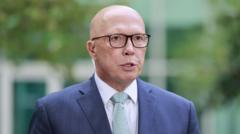In a surprising turn, Peter Dutton has abandoned his plan to eliminate work-from-home arrangements for public servants in Australia following significant backlash. The opposition leader admitted that the proposal was misguided, emphasizing a need for flexibility in the workforce.
Australia’s Opposition Leader Renounces Work From Home Ban Amid Backlash

Australia’s Opposition Leader Renounces Work From Home Ban Amid Backlash
Peter Dutton, leader of the Liberal-National Coalition, reverses controversial policy aimed at public servants in response to public criticism and impending elections.
Article Text: Australia’s opposition leader, Peter Dutton, has retracted a controversial election pledge to end work-from-home arrangements for public servants after facing intense criticism. On Monday, Dutton acknowledged that the Liberal-National Coalition had “made a mistake” in pushing the policy and issued an apology to the public.
The planned shift was part of a broader strategy aimed at enhancing efficiency within the public sector, which also included proposals for significant job cuts. Critics, including members of the ruling Labor government, argued that abolishing work-from-home options would disproportionately impact women in the workforce.
“We got it wrong and we have apologised for it,” Dutton told media representatives at a press briefing. He clarified that the initial policy only targeted public servants in Canberra but accused the Labor party of exaggerating the implications amidst a "smear campaign."
Shadow finance minister Jane Hume reiterated the coalition’s commitment to flexible working arrangements, stating, “We have listened, and understand that flexible work, including work from home, is part of getting the best out of any workforce.”
The Coalition’s proposals also included a plan to cut 41,000 public service jobs. While specifics on which departments would be affected have been requested, some party members had indicated that forced redundancies might occur. However, Hume later assured that the goal, if elected, would involve reducing headcount through voluntary attrition and a hiring freeze over five years, rather than through layoffs.
In contrast, Dutton suggested inconsistencies in their policy by acknowledging errors relating to communications about redundancies. This inconsistency has provided ammunition for the Labor government, which quickly seized on the shift in the coalition’s stance. “This just shows Peter Dutton is all over the shop,” Employment Minister Murray Watt stated, asserting that despite policy changes, Dutton’s image would remain unchanged.
Globally, calls for a return to more traditional work arrangements have gained traction, with high-profile leaders like US President Donald Trump advocating for full office attendance. However, in Australia, such sentiments have encountered resistance from a workforce concerned primarily with cost-of-living issues.
The planned shift was part of a broader strategy aimed at enhancing efficiency within the public sector, which also included proposals for significant job cuts. Critics, including members of the ruling Labor government, argued that abolishing work-from-home options would disproportionately impact women in the workforce.
“We got it wrong and we have apologised for it,” Dutton told media representatives at a press briefing. He clarified that the initial policy only targeted public servants in Canberra but accused the Labor party of exaggerating the implications amidst a "smear campaign."
Shadow finance minister Jane Hume reiterated the coalition’s commitment to flexible working arrangements, stating, “We have listened, and understand that flexible work, including work from home, is part of getting the best out of any workforce.”
The Coalition’s proposals also included a plan to cut 41,000 public service jobs. While specifics on which departments would be affected have been requested, some party members had indicated that forced redundancies might occur. However, Hume later assured that the goal, if elected, would involve reducing headcount through voluntary attrition and a hiring freeze over five years, rather than through layoffs.
In contrast, Dutton suggested inconsistencies in their policy by acknowledging errors relating to communications about redundancies. This inconsistency has provided ammunition for the Labor government, which quickly seized on the shift in the coalition’s stance. “This just shows Peter Dutton is all over the shop,” Employment Minister Murray Watt stated, asserting that despite policy changes, Dutton’s image would remain unchanged.
Globally, calls for a return to more traditional work arrangements have gained traction, with high-profile leaders like US President Donald Trump advocating for full office attendance. However, in Australia, such sentiments have encountered resistance from a workforce concerned primarily with cost-of-living issues.



















